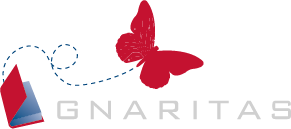We’re glad to have the opportunity at last to explain our peculiar name – “practical, applied knowledge” certainly represents what we’re all about. We’ve heard many and varied pronunciations of Gnaritas since the company started and are proud to be able to claim inclusion in a “Boston Magazine” article that featured local businesses with incomprehensible titles.
The language and labels we use in the education and learning field, as in every area of life, can be a source of either clarity or confusion, with limitless potential for misinterpretation between those involved; one person’s “e-learning” is another’s “technology-supported asynchronous stand-alone learning program.” Of course we interpret what we hear and read through our own filters and mental models. A colleague described a conversation that went on for several minutes between two friends, each using the word “segway” with a different meaning: one talking about the personal scooter machine, the other about a conceptual “segue” between two ideas. Eventually the penny dropped, but not before quite a lengthy, entirely agreeable, and mutually misunderstood exchange had taken place.
It’s easy to fall into the trap of using jargon that’s familiar to some audiences, but quite nonsensical to others. Not for nothing is there a Plain English Campaign in the UK, which fights against “gobbledygook, jargon, and misleading information” in public communications, of which there is without a doubt an endless supply. Here at Gnaritas, we spent some time discussing the terms we should use on this site to categorize our services, and it was surprisingly difficult to decide on what we hope are clear and accurate labels to describe what we do. (Let us know if not!)
We’d be interested in your thoughts. How do you ensure the language you use in your work is clear and unambiguous? Do you have any examples of annoying jargon or phrases that make you cringe?
2 Comments
Comments are closed.

For me, right now it’s the term “social learning.” E-learning pundits love the idea, and many are emerging as “experts.” No doubt wikis, blogs and their ilk have value, but the label “social learning” is to me very squishy. Does adding a bulletin board to the end of an elearning course constitute social learning? Or does it have to be a blog or wiki? If an expert builds a wiki alone, is that social learning, or does it require other input? If two workers chat about a particular application, is that social learning, even if little “learning” may be involved? I love that Gnaritas doesn’t use the phrase anywhere (and if they do, no offense!).
As a preacher, my whole life is built on effective communication. It doesn’t matter if I think I’m clear on a topic. What matters is what people understand, and each community has its own idiosyncrasies.
Take “simple” for example. This relatively harmless word has slipped past my lips thousands of times, and in each context the intended meaning was along the lines of “easy” as in “Changing wiper blades is simple,” or “Simplify your life by getting rid of the stuff that sucks away your time and money with no real benefit.”
But here in the belly of Amish country, where the book of Proverbs is regularly ingested along with every dinner, “simple” has a different connotation. “I once saw a man pruning a tree with one of those cherry pickers. Had to be thirty feet up when he climbed out of the bucket to straddle the very branch he was cutting! It was the simplest thing I ever saw.”
In these parts, “simple” means “stupid” or “foolish.” Too bad it took me two years to figure that out. How simple of me.